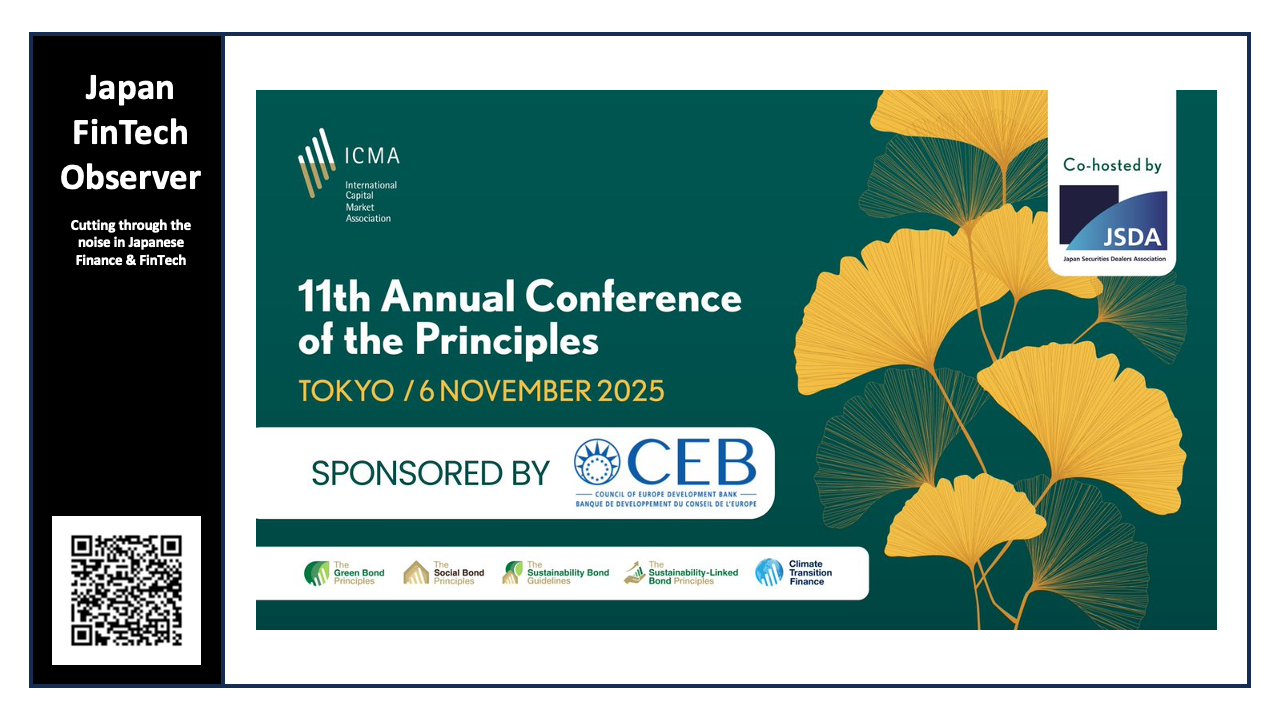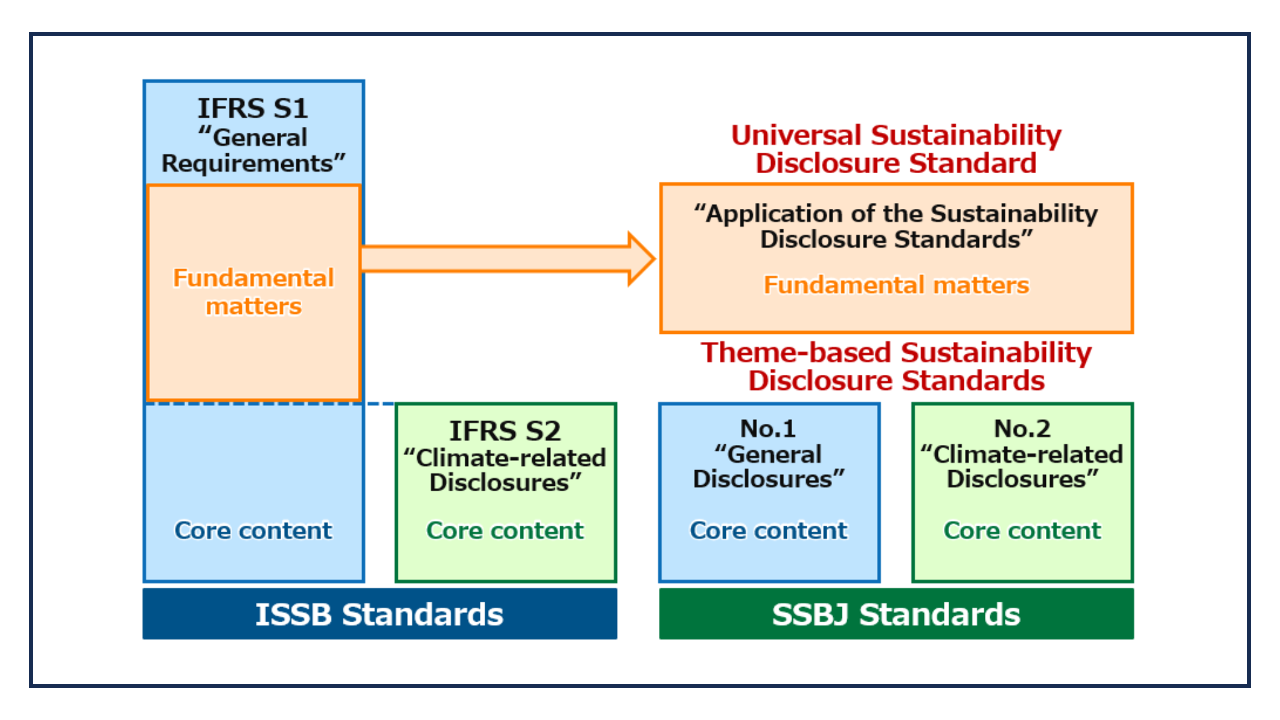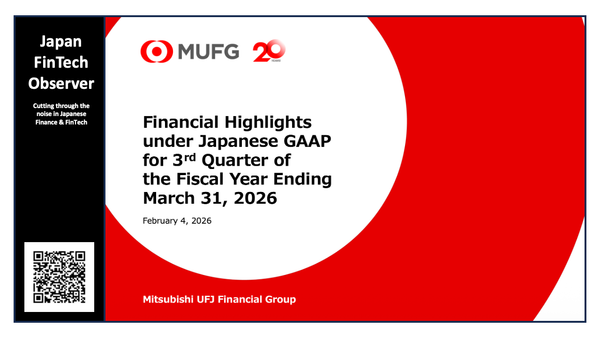ICMA's 11th Annual Conference of the Principles

The 11th Annual Conference of the Principles, co-hosted by the International Capital Market Association (ICMA) and the Japan Securities Dealers Association (JSDA) in Tokyo, brought together key stakeholders to discuss the future of sustainable finance, with a strong focus on transition and nature-related financing.
Here are our key takeaways from the morning sessions we attended.
Welcome Remarks
Speakers: Bryan Pascoe (Chief Executive, ICMA) and Takashi Hibino (Chairman and CEO, JSDA)
The welcoming session set an optimistic tone, underscoring the vital role of the ICMA Principles in providing a common language for transparency and integrity in the global sustainable bond market.
- Recognition of Japan's Leadership: Both speakers acknowledged Japan's significant contributions to sustainable finance, noting that the country's hosting of the event symbolizes its growing influence and commitment to the sector, particularly in green transformation (GX).
- The Critical Role of Transition Finance: Hibino emphasized that while the growth of sustainable bond issuance may be plateauing, the role of financial markets remains critically important. He highlighted transition finance—particularly Japan's initiatives, such as the strategic roadmap toward carbon neutrality by 2050 and the issuance of the world’s first sovereign transition bonds—as a vital tool for achieving a globally sustainable future.
- ICMA's Expanding Standards: Pascoe highlighted the Principles' evolution, noting that they are the de facto global standard, referenced by 97% of sustainable bond issuers worldwide. He stressed that the market must now focus on integrity, ambition, and depth, shifting the focus towards credibility and alignment with real economy transitions.
Opening Remarks
Speaker: Yutaka Ito (Commissioner, Financial Services Agency - JFSA)
Ito's address focused specifically on the dual challenges of climate risks—transition and physical—and the need for global cooperation, especially in Asia.
- Addressing the Dual Climate Risks: The Commissioner emphasized that climate risks are immediate, requiring comprehensive action that addresses both the long-term shift to a low-carbon economy (transition risks) and the direct impacts of climate change (physical risks).
- Japan's Domestic Mobilization: He detailed the Japanese government’s commitment to mobilize approximately ¥150 trillion (USD $1 trillion) over the next decade through public-private financing to support its Green Transformation (GX) strategy. This includes the issuance of sovereign transition bonds to fund R&D and GX projects.
- The Asia GX Consortium: Ito highlighted the importance of transition finance in Asia, given that the region accounts for nearly half of global greenhouse gas emissions. He announced the formation of the Asia GX Consortium (launched October 2024), a collaboration between the JFSA and ASEAN financial authorities, supported by the Asian Development Bank, to share best practices and structure viable transition finance projects in the region.
- Focus on Physical Risk: The Commissioner also addressed the increasing urgency of physical risks, noting that the growing protection gap in natural catastrophe insurance must be tackled through innovative products (like catastrophe bonds) and coordinated efforts by supervisors and the private sector to promote risk reduction and resilient infrastructure.
2025 Innovations and Guidance from the Principles
Speakers:
- Moderator: Nicholas Pfaff (Deputy CEO, Head of Sustainable Finance, ICMA)
- Isabelle Laurent (Deputy Treasurer, EBRD)
- Alban de Fay (Head of Fixed Income SRI processes, Amundi Asset Management)
- Agnes Gourc (Head of Sustainable Capital Markets, BNP Paribas)
This panel, featuring members of the Principles' Executive Committee, unveiled and discussed two major new pieces of market guidance: the Climate Transition Bond Guidelines and the Sustainable Bonds for Nature Practitioner’s Guide.
Key Takeaways on New Guidance:
- Climate Transition Bond Guidelines (CTBG):
- Stand-alone Label: The panel confirmed the introduction of a new, standalone Climate Transition Bond label, distinct from Green Bonds, aimed at specifically financing credible decarbonization in high-emission, hard-to-abate sectors (like steel, cement, and shipping).
- Focus on Robust Safeguards: To maintain environmental integrity, the CTBG includes five key safeguards: a clear transition strategy, analysis of low-carbon alternatives, alignment with national decarbonization roadmaps, quantifiable mitigation of emissions beyond business-as-usual, and management of carbon lock-in risks.
- Project Categories: The guidance provides preliminary, non-exhaustive categories of eligible projects, focusing on themes such as early retirement of high-emission assets, fossil fuel switching (e.g., coal to gas), and carbon capture technologies. The panel emphasized this list will evolve.
- Sustainable Bonds for Nature Practitioner’s Guide:
- Sub-label of Green: This guidance is intended as a sub-label of the Green Bond Principles, allowing issuers to clearly identify nature-positive outcomes within the existing 10 eligible project categories (e.g., in sustainable land use or pollution control).
- Focus on Impact Metrics: The guide promotes better reporting on nature and biodiversity impacts, encouraging issuers to use clear metrics (both positive actions and risk mitigation) to quantify and report on nature-related contributions.
Market Dynamics and Future Outlook:
- Market Resilience: Despite geopolitical headwinds and ESG backlash (particularly in the US), panelists stressed that the market volume remains robust, and the focus is shifting from pure volume growth to integrity and depth.
- Social Bonds: The panel noted strong investor demand for Social Bonds and highlighted the latest guidance on the Harmonized Framework for Impact Reporting for Social Bonds, which now includes specific metrics for access to essential services (education, health, and finance) to enhance comparability and transparency for investors.
- Global Collaboration: The panelists reiterated the need for market-led standards like the Principles to evolve continuously in collaboration with regulators and policy frameworks (such as taxonomies) to ensure that the standards remain authoritative, practical, and inclusive.
Keynote Address
Speaker: Kazuto Uchida (President, Government Pension Investment Fund - GPIF)
Uchida delivered the keynote from the perspective of the world's largest pension fund, emphasizing the long-term necessity of sustainability and GPIF's commitment to responsible investment.
- Long-Term Fiduciary Duty: Uchida defined GPIF’s overarching goal as contributing to the stability of the national pension system over the long term, which aligns directly with promoting the sustainability of global capital markets. As a super long-term investor (with a 100-year perspective) and a large owner of global assets, the sustainability of the overall economy is crucial for securing returns.
- GPIF's Sustainability Strategy: He outlined GPIF’s commitment to sustainability investment, which was formalized in its 2024 policy. This strategy aims to improve long-term portfolio performance by focusing on two key pillars:
- Reducing Sustainability-Related Risks: Analyzing and mitigating ESG risks, including those related to climate change.
- Improving Market Sustainability: Promoting a positive cycle within the investment chain where sustained corporate value creation leads to higher long-term returns.
- ESG Integration and Engagement: Uchida highlighted two key initiatives:
- ESG Integration: Verifying that entrusted asset managers incorporate sustainability elements into their investment processes both before and after investment.
- Engagement: Promoting constructive dialogue with asset managers and investee companies, recognizing that GPIF is prohibited by law from engaging in direct investment itself.
- The Investment Chain: He emphasized the importance of the "investment chain"—the flow of capital from households to companies—as a mechanism for driving sustainability and economic growth, concluding that the sustained promotion of the ICMA Principles is vital to building the liquid and efficient markets necessary for this virtuous cycle.






